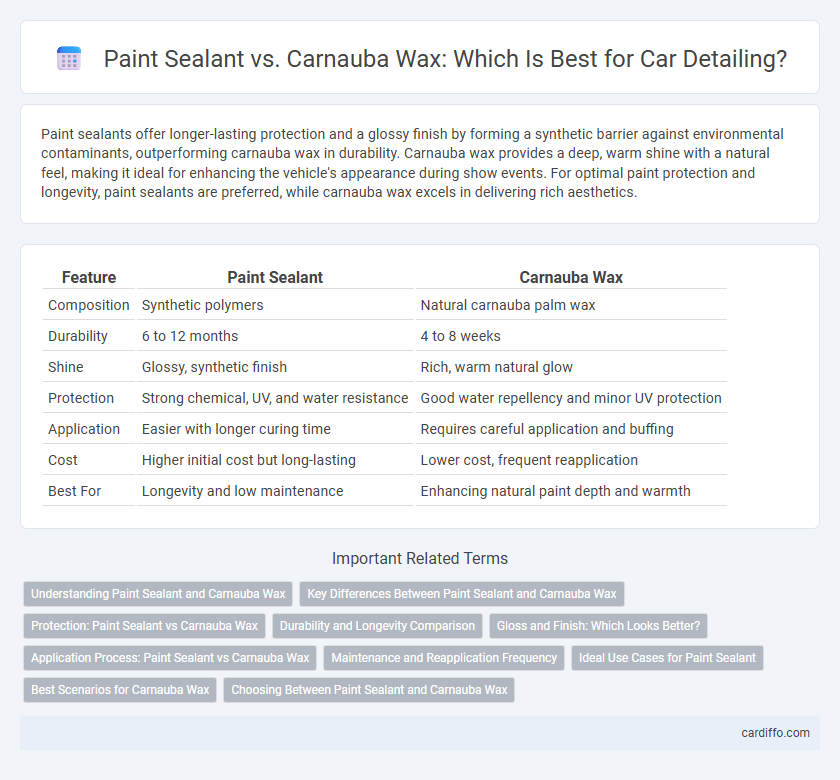Paint sealants offer longer-lasting protection and a glossy finish by forming a synthetic barrier against environmental contaminants, outperforming carnauba wax in durability. Carnauba wax provides a deep, warm shine with a natural feel, making it ideal for enhancing the vehicle's appearance during show events. For optimal paint protection and longevity, paint sealants are preferred, while carnauba wax excels in delivering rich aesthetics.
Table of Comparison
| Feature | Paint Sealant | Carnauba Wax |
|---|---|---|
| Composition | Synthetic polymers | Natural carnauba palm wax |
| Durability | 6 to 12 months | 4 to 8 weeks |
| Shine | Glossy, synthetic finish | Rich, warm natural glow |
| Protection | Strong chemical, UV, and water resistance | Good water repellency and minor UV protection |
| Application | Easier with longer curing time | Requires careful application and buffing |
| Cost | Higher initial cost but long-lasting | Lower cost, frequent reapplication |
| Best For | Longevity and low maintenance | Enhancing natural paint depth and warmth |
Understanding Paint Sealant and Carnauba Wax
Paint sealant is a synthetic polymer designed to bond with a vehicle's paint surface, offering long-lasting protection against UV rays, contaminants, and water. Carnauba wax is a natural product derived from Brazilian palm leaves, valued for its deep, warm gloss and hydrophobic properties that repel water and dirt. Understanding the differences in durability, application ease, and finish between paint sealants and carnauba wax helps car detailers choose the best product for enhancing and protecting automotive paint.
Key Differences Between Paint Sealant and Carnauba Wax
Paint sealant offers long-lasting protection by forming a synthetic polymer barrier that can last up to 6 months or more, whereas carnauba wax, derived from natural palm leaves, typically provides a warmer, glossier finish but lasts only 4 to 6 weeks. Paint sealants are more resistant to environmental contaminants like UV rays, acid rain, and road salts, while carnauba wax excels in enhancing water beading and depth of color. The application process for sealants is often more durable and requires less frequent reapplication compared to the organic, though aesthetically pleasing, nature of carnauba wax.
Protection: Paint Sealant vs Carnauba Wax
Paint sealants provide longer-lasting protection, typically lasting 6 to 12 months by forming a synthetic barrier against UV rays, contaminants, and water. Carnauba wax offers a natural, deep shine but generally protects the paint for only 4 to 8 weeks due to its organic composition. Sealants resist environmental damage better, while carnauba wax excels in enhancing gloss and hydrophobic properties for short-term protection.
Durability and Longevity Comparison
Paint sealants typically offer superior durability and longevity compared to carnauba wax, lasting up to 6 months or more with proper maintenance. Carnauba wax provides a natural, deep gloss but usually lasts only 4 to 6 weeks before requiring reapplication. Choosing paint sealant ensures extended protection against environmental contaminants and UV damage, making it ideal for long-term vehicle maintenance.
Gloss and Finish: Which Looks Better?
Paint sealants deliver a high-gloss, mirror-like finish that enhances the depth and clarity of your vehicle's paint, lasting up to six months or more with proper maintenance. Carnauba wax provides a warm, natural sheen with rich, deep tones, particularly on darker paints, but requires more frequent reapplication every 4 to 6 weeks. For those prioritizing maximum gloss and longer-lasting protection, paint sealants offer a superior finish, while carnauba wax appeals to enthusiasts seeking a classic, hand-applied shine.
Application Process: Paint Sealant vs Carnauba Wax
Paint sealants apply easily using a foam applicator pad, creating a smooth, even layer that bonds chemically with the vehicle's paint for long-lasting protection, often lasting up to six months. Carnauba wax requires a meticulous hand application with a soft cloth or applicator, typically involving several thin layers that must be buffed to a high shine, providing a natural, deep gloss but with a shorter durability of about four to six weeks. The paint sealant's synthetic composition allows for quicker curing and less frequent reapplications compared to the labor-intensive, organic process needed for carnauba wax.
Maintenance and Reapplication Frequency
Paint sealants offer longer-lasting protection, typically maintaining their effectiveness for six to nine months before requiring reapplication. Carnauba wax provides a deep, natural gloss but generally needs to be reapplied every four to six weeks to maintain optimal protection and shine. Regular maintenance with a paint sealant reduces the frequency of reapplications, making it ideal for those seeking durable, low-maintenance vehicle care.
Ideal Use Cases for Paint Sealant
Paint sealants provide long-lasting protection against UV rays, acid rain, and environmental contaminants, making them ideal for vehicles exposed to harsh weather conditions or frequent road travel. Their synthetic composition forms a durable, glass-like barrier that enhances gloss and requires less frequent reapplication compared to carnauba wax. Paint sealants are especially beneficial for those seeking extended protection with minimal maintenance on daily-driven or outdoor-stored cars.
Best Scenarios for Carnauba Wax
Carnauba wax excels on older or classic cars by enhancing deep gloss and providing a warm, natural finish unmatched by synthetic sealants. It performs best in mild climates where its water-repellent and UV-protective properties help preserve paint without frequent reapplication. Enthusiasts seeking a rich, hand-crafted shine and a protective layer build the craft of traditional detailing around carnauba wax for show-quality results.
Choosing Between Paint Sealant and Carnauba Wax
Choosing between paint sealant and carnauba wax depends on desired durability and finish quality; paint sealants provide longer-lasting protection with synthetic polymers lasting up to six months, while carnauba wax offers a deep, natural gloss but requires more frequent application every 4-6 weeks. Paint sealants excel in resisting environmental contaminants such as UV rays and acid rain, making them ideal for harsh climates, whereas carnauba wax enhances color richness and depth, favored for show cars and classic vehicles. Evaluating maintenance commitment and environmental exposure helps determine the best option for maintaining paint protection and aesthetic appeal.
Paint Sealant vs Carnauba Wax Infographic

 cardiffo.com
cardiffo.com